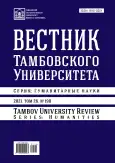Organizational and pedagogical conditions for global citizenship education in the process foreign language teaching of bachelors in humanities
- Authors: Sherekhova O.M.1
-
Affiliations:
- Petrozavodsk State University
- Issue: Vol 26, No 190 (2021)
- Pages: 42-52
- Section: THEORY AND METHODS OF FOREIGN LANGUAGE TEACHING
- URL: https://bakhtiniada.ru/1810-0201/article/view/298330
- DOI: https://doi.org/10.20310/1810-0201-2021-26-190-42-52
- ID: 298330
Cite item
Full Text
Abstract
Since the launch of the UN Secretary-General’s Global Education First Initiative (GEFI) in 2012 global citizenship education including the formation of the younger generation’s readiness to live in a “universal world” has been one of the modern education priorities. Having analyzed scientific research in the field of global citizenship, the international experience of global citizenship education, as well as the current situation in the world, we substantiate the need for the global citizenship formation among university students. We define the organizational and pedagogical conditions for the global citizenship education of bachelors of humanities in the foreign language education process. We believe that for the successful implementation of this goal, the teacher must be aware of the need for global citizenship education, possess knowledge related to the phenomenon of global citizenship, which will allow him/her to effectively manage the learning process and interact with students. It is also very important to create the environment that provides an atmosphere of cooperation, active behavior, and broad scope for initiative, where intersubjective relationships based on mutual respect, mutual trust, and acceptance of each other as values are of primary importance. We describe the experience of integrating the course “Facing Global Challenges” into the process of foreign language education. It provides an understanding of global governance structures, the Sustainable Development Goals, the importance of the connection between global, national and local systems and processes. It has been proved that systematic use of innovative teaching methods will contribute to the development of students’ global thinking, the development of skills, values and attitudes necessary for active interaction in solving global challenges to humanity.
About the authors
O. M. Sherekhova
Petrozavodsk State University
Author for correspondence.
Email: olmili@mail.ru
ORCID iD: 0000-0002-2817-7700
Candidate of Pedagogy, Associate Professor, Associate Professor of Foreign Languages of Humanitarian Programmes Department
33 Lenina St., Petrozavodsk 185910, Republic of Karelia, Russian FederationReferences
- Kasatkin P.I. Sovremennoye obrazovaniye: funktsii i prednaznacheniye [Modern education: functions and mission the problems of modern education]. Problemy sovremennogo obrazovaniya – Problems of Modern Education, 2017, no. 5, pp. 109-120. (In Russian).
- Yagudin I.R. Institut grazhdanstva v usloviyakh sovremennykh mirovykh tendentsiy [The institution of citizen-ship in conditions of the modern world trends]. Vestnik PAGS – The Bulletin of the Volga Region Institute of Administration, 2013, no. 5, pp. 37-43. (In Russian).
- Borozdina Y.A. Zabota i sotsial’noye grazhdanstvo [Care and social citizenship]. Sotsiologicheskiye issledova-niya – Sociological Studies, 2015, no. 10, pp. 84-93. (In Russian).
- Maximova L.Y. Evolyutsiya fenomena grazhdanstva v kontekste istoricheskogo razvitiya Zapadnoy Yevropy [Evolution of the phenomenon of citizenship in the context of historical development of the Western Europe]. Vestnik MGIMO-Universiteta – MGIMO Review of International Relations, 2017, no. 6 (57), pp. 40-63. doi: 10.24833/2071-8160-2017-6-57-40-63 (In Russian).
- Litvinovich V.G. Sotsial’no-pedagogicheskiye usloviya formirovaniya global’noy grazhdanstvennosti uchash-cheysya molodezhi v dukhe idey kul'tury mira [Social and pedagogical conditions of the students global citizen-ship formation in a spirit of culture of peace ideas]. Vestnik MGLU. Ser. 2. Pedagogika, psikhologiya, metodika prepodavaniya inostrannykh yazykov [MSLU Bulletin. Ser. 2. Pedagogy, Psychology, Methods of Teaching For-eign Languages], 2018, no. 1 (33), pp. 40-49. (In Russian).
- Akopov S.V. «Mirovoye grazhdanstvo» glazami yego kritikov (pyat’ argumentov protiv «nasyshchennogo» kosmopolitizma M. Nussbaum) [“World Nationality” by eyes of its critics (five arguments against “saturated” cosmopolitism of M. Nussbaum)]. Upravlencheskoye konsul’tirovaniye – Administrative Consulting, 2015, no. 2, pp. 107-114. (In Russian).
- Nussbaum M. Kosmopolitizm i patriotizm [Cosmopolitism and Patriotism]. Logos, 2006, no. 2 (53), pp. 110-119. (In Russian).
- Tokmakova Y.V. Psikhologo-pedagogicheskiye usloviya obucheniya inoyazychnomu professional’nomu obshcheniyu studentov napravleniya podgotovki «Tekhnologiya proizvodstva i pererabotki sel’skokhozyaystvennoy produktsii» na osnove modeli integrirovannogo predmetno-yazykovogo obucheniya [Psychological and pedagogical conditions for teaching foreign professional communication students of “Tech-nology of production and processing of agricultural products” programme based on the model of content and language integrated learning]. Vestnik Tambovskogo universiteta. Seriya: Gumanitarnye nauki – Tambov Uni-versity Review. Series: Humanities, 2019, vol. 24, no. 181, pp. 43-54. doi: 10.20310/1810-0201-2019-24-181-43-54 (In Russian).
- Sherekhova O.M. Formirovaniye global’noy grazhdanstvennosti bakalavrov v protsesse obucheniya inostrannomu yazyku [Global citizenship development in the process of foreign language education]. Konstruktivnyye pedagogicheskiye zametki [Constructive Pedagogical Notes], 2020, no. 8-1 (13), pp. 227-237. (In Russian).
- Kladova A.A., Strakhova N.V. Antikorruptsionnoye obrazovaniye v shkole [Anti-Corruption Education at School]. Yaroslavl, Institute for Education Development Publ., 2015, 36 p. (In Russian).
- Suslov A.B. Razvitiye grazhdanskogo obrazovaniya: yevropeyskiy opyt [Development of civic education: European experience]. Obrazovaniye i nauka – The Education and Science Journal, 2012, no. 9 (98), pp. 117-128. (In Russian).
Supplementary files








